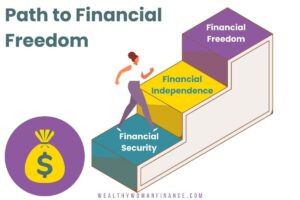You’ve probably heard people talk about financial freedom and financial independence like they mean the same thing. And while they’re definitely related, they’re not quite identical.
Understanding the difference between the two isn’t just a matter of semantics , it can actually shape the way you plan your financial future. In this post, we’ll break down what each term means, how they overlap, and why both are crucial milestones on your financial journey.
What Is Financial Independence?

When we talk about financial independence, we’re talking about reaching a point where you no longer need to work to pay your bills. Your savings, investments, or passive income streams (like rental income or dividends) are enough to cover your essential living expenses.
It’s often associated with the FIRE movement — Financial Independence, Retire Early but you don’t have to retire to be financially independent. You just have to reach a point where work becomes optional.
Here’s what financial independence might look like:
-
Your living expenses are covered without clocking into a 9–5.
-
You’ve built up enough assets to sustain your lifestyle.
-
You could walk away from your job tomorrow and still be okay.
Example:
Let’s say Sarah has investments and rental properties that bring in enough to cover his monthly costs, rent, groceries, transportation, and so on. Even if he stopped working today, he could maintain his lifestyle. That’s financial independence.
What Is Financial Freedom?
Financial freedom goes beyond just covering basic expenses, it’s about having enough wealth and flexibility to live life entirely on your terms. It includes freedom from debt, financial stress, and limitations that might prevent you from pursuing your dreams.
Key characteristics of financial freedom:
-
You have the ability to choose work, travel, hobbies, and life goals without financial constraint.
-
You are debt-free and have savings for emergencies and luxuries.
-
You feel secure and in control of your financial decisions.
Example:
John earns $150,000 a year, is debt-free, has six figures in savings, and travels four times a year. He chooses to work part-time as a consultant. Though he isn’t “retired,” he experiences full financial freedom.
Financial Independence vs. Financial Freedom: A Quick Comparison
| Feature | Financial Independence | Financial Freedom |
|---|---|---|
| Primary focus | Covering essential living expenses | Living life on your terms |
| Source of income | Passive (investments, assets) | Can be active or passive |
| Work optional? | Yes | Yes, but more flexible |
| Debt status | May still have manageable debt | Typically debt-free |
| Lifestyle | Basic needs met | Aspirational goals achievable |
Why Should You Care About the Difference?
Because where you are financially and where you want to go matter.
Maybe your current goal is just to stop living paycheck to paycheck that’s okay. That’s the road to independence.
But if your dream is to travel the world, build generational wealth, or pursue passion projects without worrying about bills, then you’re probably chasing freedom.
Understanding the distinction helps you:
-
Set better, more personal goals.
-
Make smarter financial decisions.
-
Stay focused as your life (and money) evolves.
How to Start Moving Toward Both

You don’t need to be a millionaire to get started. Here are a few real-world steps:
-
Get clear on your money: Track your income and expenses. Clarity is key.
-
Kill off bad debt: High-interest debt will slow you down. Make a plan to eliminate it.
-
Save and invest consistently: Even small amounts add up over time.
-
Build income streams: Whether it’s freelance gigs or side hustles, diversify your earnings.
-
Define your “enough”: Freedom looks different for everyone — know what matters most to you.
Final Thoughts
Here’s the bottom line:
Financial independence gives you the ability to stop working.
Financial freedom gives you the ability to start truly living.
They’re both worth aiming for — and depending on your season of life, you might prioritize one before the other. Just remember: it’s not all about how much you have, but how much control and peace of mind you’ve gained in the process.
No matter where you are on the journey, keep going. Your future self will thank you.


Recent Comments